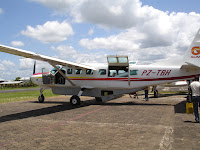 The jungle has many advantages but good nutrition, unfortunately, is not one of them. Many children have big bellies, which I recently discovered occurs when a lack of protein forces the body to consume the abdominal muscles as a source of amino acids. Since Peace Corps volunteers live with the people, we face some of the same challenges, though with multivitamins from Doc and a basic knowledge of nutrition we are better off than many.
The jungle has many advantages but good nutrition, unfortunately, is not one of them. Many children have big bellies, which I recently discovered occurs when a lack of protein forces the body to consume the abdominal muscles as a source of amino acids. Since Peace Corps volunteers live with the people, we face some of the same challenges, though with multivitamins from Doc and a basic knowledge of nutrition we are better off than many.Volunteers go to great lengths to avoid the scraping of their muscles in place of protein. For my first few months, I amassed a stockpile of beans, peas, lentils, and canned meat. Other volunteers have become small-scale chicken farmers to add eggs to their diet. I literally plan my meals around different protein sources or to make up for pasta night (Thursday). Even so, I estimate that I only eat a little over half the protein that I need.
Protein must be bought or caught, and on my Peace Corps allowance, caught meat is more desirable. Desperate about the potential loss of abs, I went to Tomahawk, a hunting and fishing store in the city. Volunteers are not allowed to use guns, so as far as obtaining meat, the fishing section was for me. The clerk needed to explain practically everything. My dad took me fishing when I was young, but even then I seemed to catch more ducks than fish. Well, I suppose it was actually two fish and one duck, but still. Eventually I walked out with a simple rod and reel, extra string, a few hooks, some weights, and working knowledge of how to tie a fishing knot.
It did not begin well. On my way home from Tomahawk, the line became impressively tangled. I learned a lot about knots that day. After much cutting and reeling and un-reeling and experimentation, I figured out how the reel works. Casting, however, was a splendid failure on my first day out, yesterday, and today, I realized that I had to hold the line before swinging the pole.
Nevertheless, meat came. Today I caught my first fish in eighteen years. It was an eleven-inch piranha, naturally. Such are the everyday adventures in Amazonia. As I reeled it in, I yelled excitedly to my friend, “Look, I caught a fish! What kind is it? Can you eat it?”
“Yes,” he said, “ Yes, you can eat it, but watch out, it can eat you too!”
He then helped me clean my prize, of which I was also clueless. So, tonight I will have poached piranha…if I can figure out what “poached” means.












